
Our Climate and Nature Approach
Climate and nature are interconnected systems that make dairy possible. By working with farmers, partners and industry - and by setting ambitious targets and tracking progress - we’re focused on reducing Greenhouse gas (GHG) emissions and contributing to healthy ecosystems, with the goal of building a more resilient dairy industry for the long-term.
Climate change poses a real challenge to the dairy sector and global food security - but it’s also an opportunity to lead. It’s changing the way we think about resources and production, and we’re responding with practical action.
By reducing greenhouse gas emissions and adapting to a changing climate, The a2 Milk Company is building a stronger, more resilient value chain so we can continue delivering A1 protein free milk for generations to come.
Where our Emissions Come From
Understanding our emissions profile helps us see both the scale of the challenge and the progress we are making.
Our footprint includes:
- Scope 1 – Direct emissions from our operations.
- Scope 2 – Indirect emissions from electricity use.
- Scope 3 - Emissions generated within our value chain.
Scope 3 accounts for over 99% of our total emissions, most of which come from on-farm activities, with the greatest contribution coming from enteric methane from cows. Therefore, on-farm emissions are our biggest focus area for action and support.
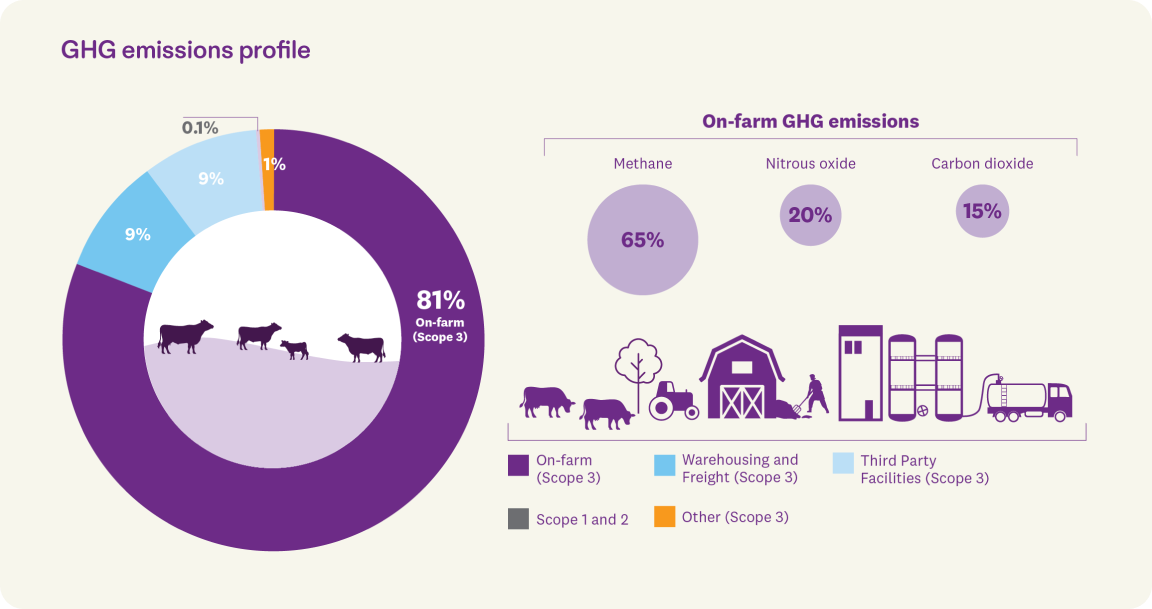
The a2 Milk Company’s emissions profile as at 30 June 2025.
Emissions Targets for a Growing Business
The a2 Milk Company has set emissions reduction targets across the business. These are:
- Net zero GHG emissions for Scope 1 and Scope 2 by 2030
- Net zero GHG emissions for Scope 3 by 2040
Our aim is not simply to reduce emissions, but to do so whilst also growing the business. That’s why emissions intensity is a key indicator of progress. On that measure, we track emissions per kilogram of milk solids produced through an interim intensity target:
- 30% reduction of Scope 3 emissions, per kilogram of milk solids, by 2030 from FY21 baseline year
Emissions Reduction Targets
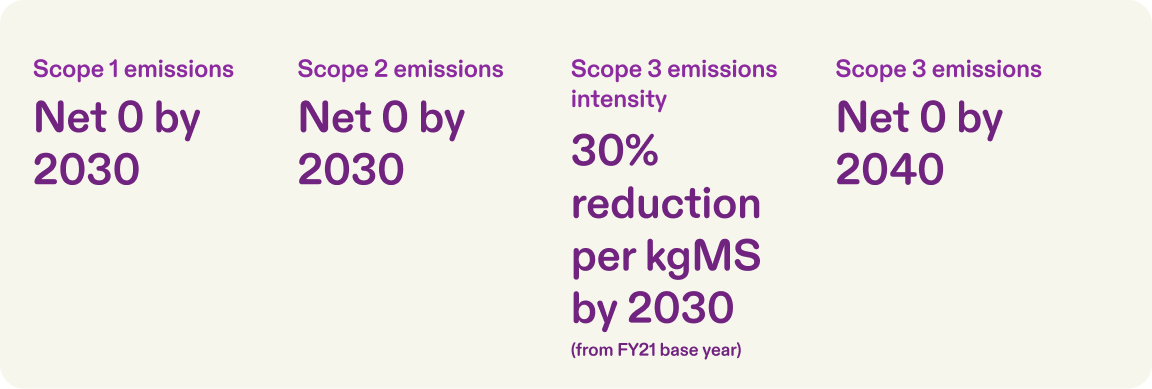
Our Progress
By investing in practical solutions and directing effort where it matters most, we are delivering meaningful emissions reductions to support our climate targets. Our Emissions Reduction Roadmap and Climate Transition Plan guide this work. The summary below highlights where we’ve made the greatest impact so far.
Scope 1 Emissions (Direct Operations)
Target
STATUS
Net 0 by 2030
On Track
As at 30 June 2025
Most of our Scope 1 emissions come from heat used in milk processing at our two manufacturing sites - Smeaton Grange in Australia and Pokeno in New Zealand. Pasteurisation requires high temperatures, which are traditionally generated using energy from fossil fuels, making this a key source of emissions.
As at 30 June 2025, we achieved a 98.8% reduction in Scope 1 emissions from our FY21 baseline, representing a major milestone in our decarbonisation journey. The reduction was driven by the replacement of a coal-fired boiler with a high-pressure electrode boiler at a New Zealand manufacturing site that was part of our operations during the reporting period to 30 June 2025. This $16 million investment, supported by a $5 million co-investment from the Government Investment in Decarbonising Industry fund, demonstrates our commitment to decarbonisation.
While the electrode boiler is no longer part of our direct operations, it continues to deliver emissions reductions within our supply chain (Scope 3), and the expertise gained from this transition is being leveraged to support further electrification initiatives at our a2 Pokeno site.
Scope 2 Emissions (Purchased Electricity)
Target
STATUS
Net 0 by 2030
On Track
As at 30 June 2025
Both manufacturing sites under our direct control during the FY25 reporting period were powered by renewable electricity contracts1, marking a significant step toward decarbonisation. While electrification increased our total Scope 2 emissions in FY25, transitioning away from fossil fuels is critical for long-term progress.
Solar panels were utilised at our Smeaton Grange facility, while our offices utilised green energy contracts, where available.
1In FY25, a manufacturing site under The a2 Milk Company’s direct control purchased Meridian’s Certified Renewable Energy production values product to enable it to exclusively match the amount of electricity it uses on an annual basis with an equivalent amount of electricity put into the national grid from one of Meridian’s hydro stations or wind farms (which have been independently verified as producing 100% renewable electricity). Actual electricity received on location is from mixed renewable and fossil fuel sources, due to the nature of the electricity transmission and distribution system.
Scope 3 Emissions (Indirect Emissions)
Target
STATUS
Emissions intensity
-30% / kg MS (from FY21 base year) by 2030
Ahead of Schedule
As at 30 June 2025
Emissions reductions
Net 0 by 2040
On Track
As at 30 June 2025
The most significant proportion of our emissions come from on-farm enteric methane. We are focused on practical, science-led solutions that reduce these emissions while sustaining productive and resilient farming systems. Our approach is both customer and cow focused, ensuring methane reduction strategies support animal health and maintain the quality our customers expect.
We have a target to reduce Scope 3 emissions intensity by 30% per kilogram of milk solids by 2030 (against a FY21 baseline). FY25 data as at 30 June 2025 shows we’ve achieved a 33% reduction in Scope 3 emissions intensity and a 37% reduction in total emissions intensity across the a2MC value chain since the baseline year.
This improvement reflects greater efficiency in dairy production and energy transition within our supply chain. It’s important to note that more detailed and targeted data collection methods introduced since FY21 have also contributed to more accurate reporting of Scope 3 emissions.
Research and development
Through our investment in AgriZeroNZ, we support targeted initiatives to speed up the development and deployment of tools farmers can use to reduce emissions. Further detail is provided in the Tackling On-farm Dairy Emissions Together section below.
Supporting Farms
Through the a2™ Farm Sustainability Fund, two of our key priority areas are supporting farmers who supply A1 protein free milk to reduce GHG emissions and adapt to climate change. We provide annual funding for farmer-led projects that deliver practical solutions, such as wetland restoration, alternative fertiliser trials and solar panel installations. These initiatives not only lower emissions but also build resilience in farming systems for the future.
For more detail, see our FY25 Annual Report and Climate Statement.
Tackling On-Farm Dairy Emissions Together
Reducing greenhouse gas emissions is a challenge shared across the dairy industry. That’s why we work closely with AgriZeroNZ, Dairy Australia, DairyNZ, and the Sustainable Business Council NZ, alongside our key processing partners, to accelerate innovation and make faster progress that protects access to high-quality nutrition and supports a sustainable future for dairy.
One of the most important collaborations driving this work is AgriZeroNZ, a partnership between the New Zealand Government and leading agribusinesses and banks. We’ve invested $3.5 million NZD2 into this initiative, which matches private-sector funding with government investment, dollar-for-dollar, to accelerate impact.
AgriZeroNZ has a clear goal: to speed up the development of practical tools that help farmers reduce enteric methane and nitrous oxide emissions without compromising productivity or profitability.
Solutions under development include probiotics, inhibitors, vaccines, reproductive technologies and pasture.
For information on the progress and research outcomes of the AgriZeroNZ partnership, visit agrizero.nz/progress.
2As at 30 June 2025
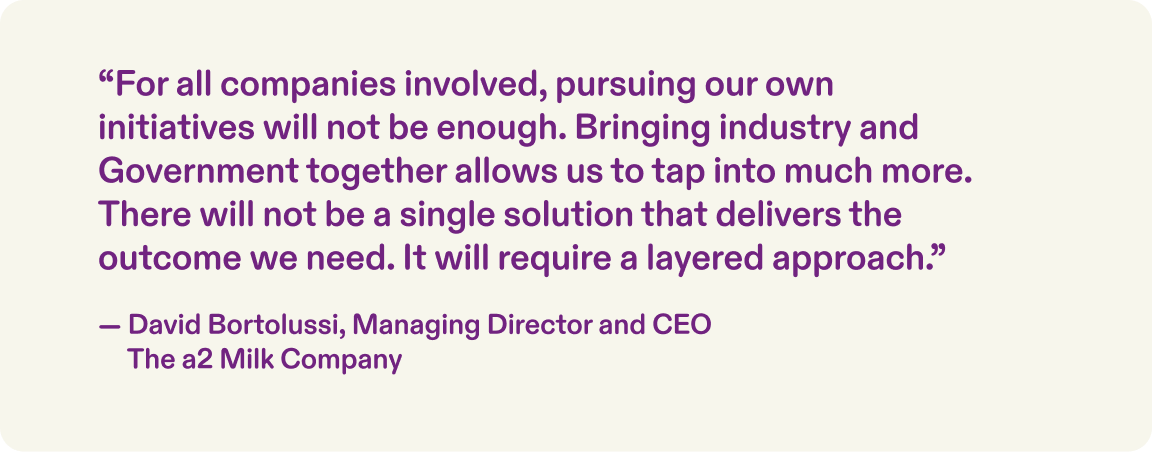
Reporting and Methodology
We calculate our greenhouse gas emissions in line with the Greenhouse Gas Protocol, using recognised emissions factors from Australia, New Zealand and other relevant jurisdictions. Our reporting covers Scope 1, 2 and 3 emissions, and is updated annually through boundary assessments to ensure accuracy and consistency.
Scope 2 emissions are reported using both the location-based method (which applies grid-average emission factors) and the market-based method (which reflects renewable energy procurement).
We have developed an Emissions Reduction Roadmap that draws on current and emerging mitigation strategies. This includes working with farmers and processors through initiatives like the a2™ Farm Sustainability Fund. We continue to refine our approach as new data, technologies and reporting standards evolve.
For detailed methodologies, emissions factors, assumptions and full inventory results, please refer to our Climate Statement, which can be accessed via our ESG reporting library.
The ESG reporting library contains all voluntary and mandatory climate and ESG disclosures, performance updates and detailed sustainability data.
Explore Our Sustainability Focus Areas
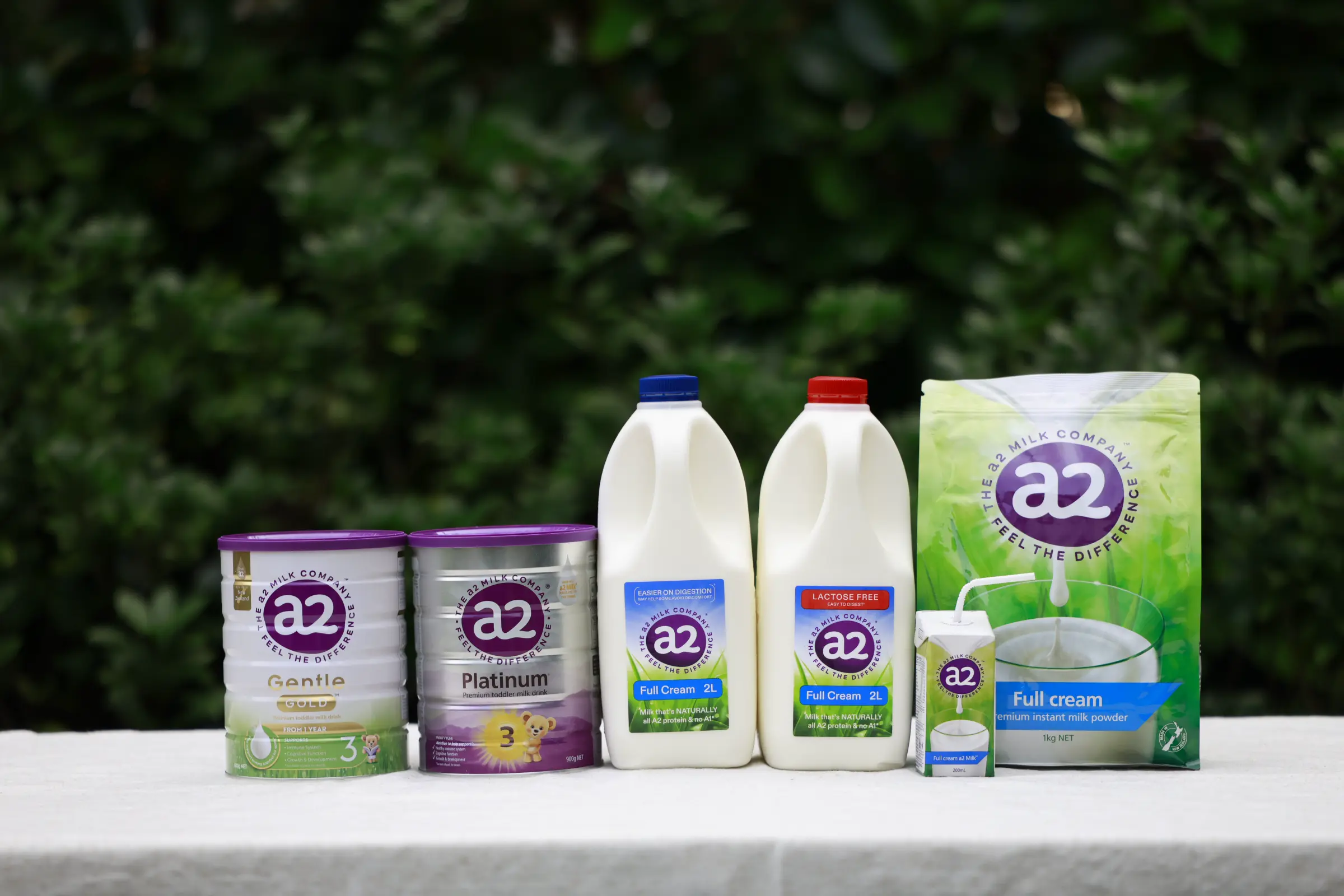
Sustainable Packaging
Improving circularity by using recyclable materials, increasing use of recycled content and providing clear, accurate on-pack information to enhance packaging recovery.
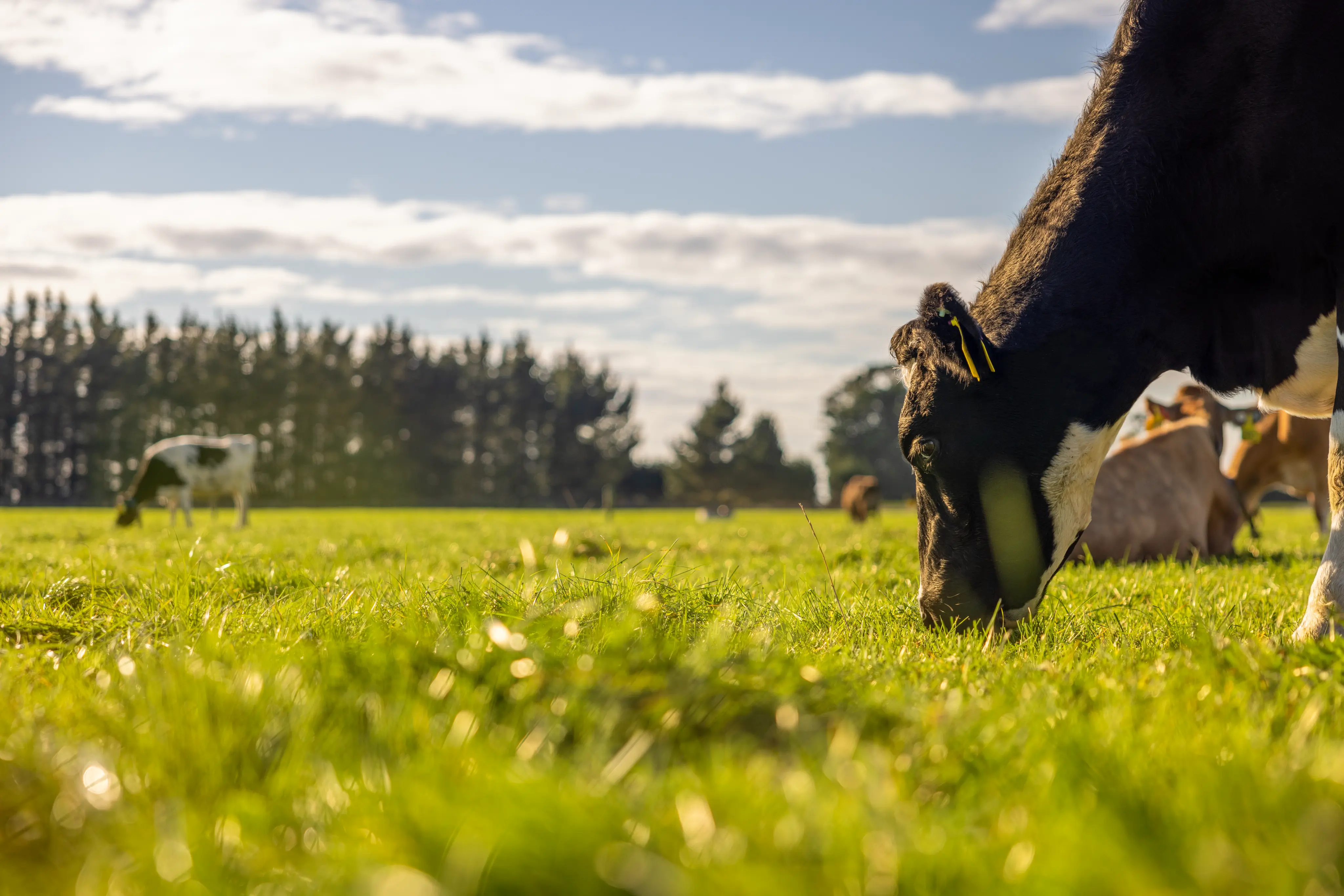
Thriving Farms
Partnering with farmers to strengthen sustainable practices and cow welfare on-farm, to build a resilient supply chain.
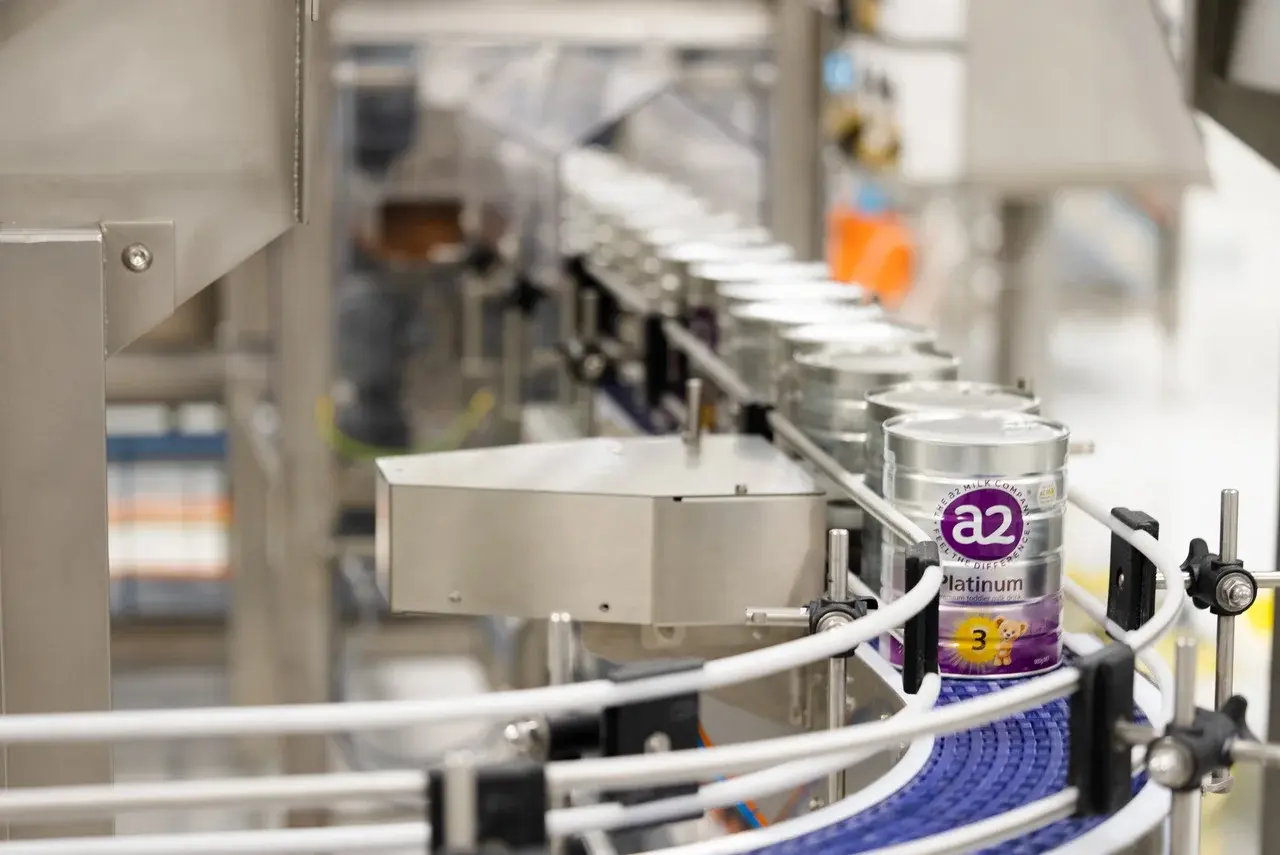
Responsible Supply Chain
Sourcing ingredients and materials responsibly, with a focus on human rights and ethical practices.

Enriching Communities
Supporting children, families and our farming communities to thrive.
